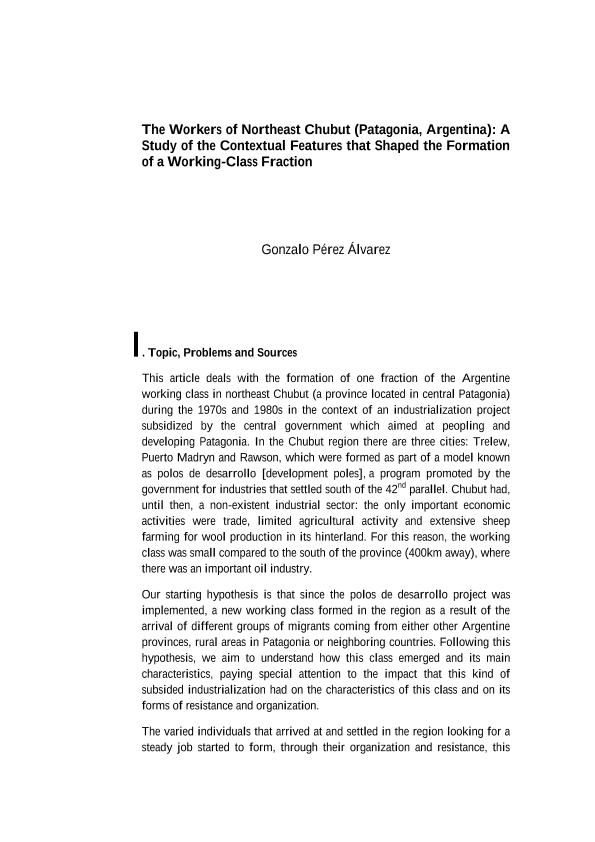Mostrar el registro sencillo del ítem
dc.contributor.author
Perez Alvarez, Gonzalo Gabriel

dc.date.available
2017-05-12T21:16:20Z
dc.date.issued
2015-06
dc.identifier.citation
Perez Alvarez, Gonzalo Gabriel; The Workers of Northeast Chubut (Patagonia, Argentina): A Study of the Contextual Features that Shaped the Formation of a Working - Class Fraction; International Journal on Strikes and Social Conflict; Workers of the World - International Journal on Strikes and Social Conflict; 1; 6; 6-2015; 84-104
dc.identifier.issn
2182-8938
dc.identifier.uri
http://hdl.handle.net/11336/16429
dc.description.abstract
We are interested in deepening the knowledge about the history of the working class in the Patagonia in general and in Chubut´s North-East especially. In this region, from the decade of sixty, there was stimulated the conformation of an industrialization subsidized by the national and provincial State, which gave origin to Trelew´s Industrial Textile Park and to the producing plant of primary aluminium, ALUAR, in Puerto Madryn. Through these years there conforms in the region a new working class, product of the massive arrival of different quotas immigrants, already be from other provinces of the country, from the rural zones of the province of Chubut and from the neighboring country of Chile. This working class, extremely heterogeneous and that in many cases was not bringing experiences of industrial work, union activity or up to of urban life, meets a social context of full employment, frequent inauguration of new factories and the possibility to improve his living conditions in the frame of obtain better conditions of work. We try to understand how this working class conforms, how develop his first actions and his organization, and in what conditions they found with the changes that begin about the middle of eighty and that impacted her squarely during the nineties. For the characteristics of what we seek study it had been non-conducive work only with written sources, because they only let us see a part of the process. These sources say little on the processes of development of organizations, the conformation of working militants, his transformations and debates. So was crucial the contribution of oral sources, as it provides key elements to approach the meaning of those facts had for the subjects who developed them. In this article we wonder specifically about the characteristics of the formation of a working class fraction in a region of the country in the frame of a subsidized industrialization.
dc.format
application/pdf
dc.language.iso
eng
dc.publisher
International Journal on Strikes and Social Conflict
dc.rights
info:eu-repo/semantics/openAccess
dc.rights.uri
https://creativecommons.org/licenses/by-nc-sa/2.5/ar/
dc.subject
Working Class
dc.subject
Formation
dc.subject
Patagonia
dc.subject
Subsidized Industrialization
dc.subject.classification
Historia

dc.subject.classification
Historia y Arqueología

dc.subject.classification
HUMANIDADES

dc.title
The Workers of Northeast Chubut (Patagonia, Argentina): A Study of the Contextual Features that Shaped the Formation of a Working - Class Fraction
dc.type
info:eu-repo/semantics/article
dc.type
info:ar-repo/semantics/artículo
dc.type
info:eu-repo/semantics/publishedVersion
dc.date.updated
2017-05-04T17:08:05Z
dc.journal.volume
1
dc.journal.number
6
dc.journal.pagination
84-104
dc.journal.pais
Portugal

dc.journal.ciudad
Lisboa
dc.description.fil
Fil: Perez Alvarez, Gonzalo Gabriel. Universidad Nacional de la Patagonia; Argentina. Consejo Nacional de Investigaciones Científicas y Técnicas. Centro Nacional Patagónico; Argentina
dc.journal.title
Workers of the World - International Journal on Strikes and Social Conflict
dc.relation.alternativeid
info:eu-repo/semantics/altIdentifier/url/http://digitalcommons.ilr.cornell.edu/cgi/viewcontent.cgi?article=1005&context=wotw
Archivos asociados
